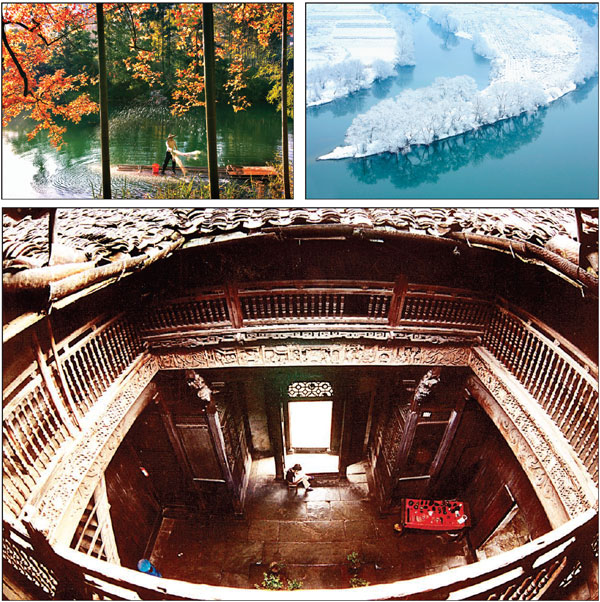With beautiful scenery, ancient Wuyuan sends visitors back in time




Travelers today are apt to look for tranquil places that are less commercialized and more isolated. One way to avoid a clamorous crowd is to choose a destination that keeps a low profile and head there after the peak season.
Wuyuan county, with its ancient towns and villages in Jiangxi province, is ideal for such exploration in autumn and winter. In the spring, tourists flock to see the profusion of bright yellow rapeseed flowers across terraced hills, but fall provides its own color in a riot of red-leafed maple trees against a backdrop of pebbled streets and black-tiled roofs.
The region's mountainous terrain, once a barrier for easy travel, helped preserve its bygone charms. Now the glimpses into the past - the wooden arches, stone bridges and maze of winding streets - are easily accessible by highspeed rail from Beijing (eight hours) or Shanghai (four hours).
|
Scenes from Wuyuan(Clockwise): a local forest beside a stream, the moon-shaped bay, and a century-old house. Left: Zhang Yinquan, right: Hu Weimin, below: Ren Chuncai, For China Daily |
For those with an interest in ancient Chinese architecture, Wuyuan offers a beautifully preserved slice of life. Residential houses are built in the authentic Hui style, with white walls and black roof tiles. Some even offer bed-and-breakfast accommodations for visitors. Courtyards feature delicate and intricate wood sculptures on the pillars, doors and corridors. The area abounds in temples, bridges and arches, many more than 1,000 years old.
To preserve the ancient architecture, forest and culture, the county government has eschewed development, including proposed resorts that would have resulted in billions of yuan in investment. Leaders say they prefer to maintain a harmonious relationship with nature, and seek to shape the area into a natural cultural park.
Two villages known for their architecture, customs and crafts - Likeng and Wangkou - are candidates for the World Cultural Heritage list.
A leisurely stroll in Wangkou sends a visitor winding through a maze of stone-paved streets, dotted with the heavy wooden gates of old and dark shops. Sometimes the labyrinth leads to a dead end, but another path might lead a walker to a river, where women are washing clothes on the riverbank. Visitors may find that time seems to move more slowly in the village.
After a long walk, a performance by a Nuo dance and opera troupe provides relaxing entertainment. Rooted in totem worship, the 3,000-year-old Nuo religious sacrifice and exorcism ritual maintains an important role in the lives of the local people.
Performers wear painted masks and dance, praying for good harvests, longevity and other blessings. Those lucky enough to meet the Chuantangban, a band of six to eight musicians carrying traditional Chinese musical instruments, such as the surna or erhu, can watch them play for farmers taking a break from the fields.
Other small villages like Shicheng, or stone city, provide photographers with striking images. A stone cliff stands at the entry to the village, like a natural city wall. Hundreds of old maple trees, soaring up to 35 meters in height, tower over the black-and-white houses, making them look like toy bricks.
Souvenirs from a trip to Wuyuan trip are never factory-produced clich��s. Wuyuan is known as the cradle of organic teas, and organic food is readily available, including dried mushrooms and fish.
Oil paper or silk umbrellas, wood sculptures and inkstones also tempt tourists.
Wuyuan also offers a special lure for bird enthusiasts. It implemented a logging ban 10 years ago and the heavily forested county shelters rare and endangered species, including the yellow-throated laughingthrush, which was long thought to be extinct. And Yuanyang Lake is the biggest winter habitat for Mandarin ducks in Asia.
xiaoxiangyi@chinadaily.com.cn















